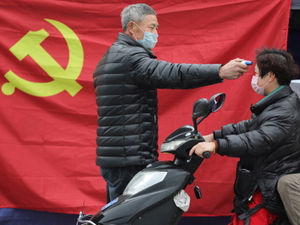China shows we can beat coronavirus in the end
China gives hope that coronavirus can be beaten – but also of the dangers of relaxing as infections fall.

For the first time in months, China recorded no new cases of Covid-19 in the virus epicentre Wuhan or in the surrounding Hubei province, officials said.
Wuhan had previously reported thousands of new cases of coronavirus infection daily, overwhelming its health care system.
It is a dramatic fall, showing that China is now at the bottom of the curve – the end of the sombrero that Boris Johnson described when first revealing the scale of the outbreak in the UK.
But it is not yet the end of the crisis for China.
The thought is that once the virus has been isolated and a large bulk of the population has been infected, it weakens and dies. So-called herd-immunity comes when the virus has nowhere to go because most people have already suffered and are protected from catching it again.
The danger comes when people from outside the infected areas start to reinhabit. China’s health ministry said results over the past 24 hours showed 34 new cases – all detected in people arriving from abroad. Eight new deaths were reported, all in Wuhan.
Of those new cases of infection, 21 were in Beijing, nine in the southern manufacturing centre Guangdong, two in Shanghai and one each in coastal Zhejiang and Heilongjing in the far north-east.
China has only just begun loosening strict travel restrictions within the country, but has stepped-up 14-day quarantine regulations on those arriving in Beijing, Shanghai and elsewhere from overseas, amid expectations of a new influx of students and others returning home.
The country has now recorded a total of 80,928 confirmed virus cases with 3,245 deaths. Another 70,420 people have been released from hospital and 7,263 remain in treatment.
“It’s very clear that the actions taken in China have almost brought to an end their first wave of infections,” said Ben Cowling, the head of the division of epidemiology and biostatistics at Hong Kong University’s School of Public Health. “The question is what will happen if there’s a second wave, because the kind of measures that China has implemented are not necessarily sustainable in the long term.”

China’s leader, Xi Jinping, had called for a “people’s war” against the epidemic, and the party’s propaganda outlets have in recent weeks hailed the party’s response as a success and a model for other countries.
The party’s approach has also come at a great cost to civil liberties and economic livelihoods, and some critics have questioned whether it would be viable in open societies where personal freedoms are fiercely protected.
In recent days, fear of the virus and pressure from the public to take stronger measures have pushed democratic governments such as Italy, Spain and France to impose stringent lockdowns, strategies that some countries were hesitant to adopt just weeks ago. Britain still has freedom of movement, but with new powers being given to the government that may change.
The longer-term effects of such policies have been particularly evident in Wuhan and Hubei. For weeks, hospitals were overwhelmed and medical workers lacked basic supplies and protective gear. Residents protested over food shortages. Critically ill patients struggled to find timely care. Many died.
In the early days of the outbreak, a shortage of test kits and hospital beds meant that many could not be tested — and infectious disease experts say some with mild symptoms are probably going undetected now. The government has altered its counting methodology repeatedly, causing large fluctuations in figures.
Flaws in China’s coronavirus strategy in the initial weeks contributed to a surge in viral transmission within families. When hospitals in Wuhan exhausted beds or testing kits, they sent many of the sick home where they infected relatives.
Public mistrust and resentment toward the government elevated to martyrdom the life of Li Wenliang, a Wuhan doctor who was among the first to recognise the infection as a new danger and was penalised by the police in early January for having shared his concerns, which they called an illegal rumour. He died of the infection a month later.
Even as the immediate threat of the virus has diminished in China, the party has continued to push hard to control what is said about itself. The authorities have detained citizen journalists and aggressively censored news reports and social media outlets.
The end of the crisis appears to be in sight now for China. After disastrously ignoring the early signs of coronavirus, it used its Communist might to quell it and hopefully kill it.
The world will watch progress in China. And it remains to be seen if the Western world will follow a similar pattern to that of China and whether we as a democratic society have done enough.





